There is a dearth of literature on the practice of palliative and end-of-life care in tertiary care psychiatric hospitals, where patients can stay for extended lengths of time, even decades. Patients who stay for long periods in psychiatric hospitals, particularly geriatric patients, may find themselves in need of palliative and end-of-life care (
1). This includes patients with illnesses such as cancer, organ failure, and neurodegenerative diseases as well as patients with dementia, a terminal condition frequently encountered in psychiatric hospitals. Unfortunately, among family caregivers and even nursing staff, dementia is often not viewed as a terminal illness. Interestingly, a study conducted in Australia showed that around 50% of nursing staff and 60% of family caregivers did not consider dementia to be a terminal condition (
2), which reflects the necessity to increase awareness about palliative care needs among both health care professionals and caregivers. Currently, there is no published epidemiologic study that provides data on the estimated number of patients in need of end-of-life care in state psychiatric hospitals. Data related to forensic patient populations are complex; however, individuals who are found not guilty by reason of insanity and persons who are classified as civilly committed sex offenders can remain hospitalized for decades (
3).
There are numerous barriers to providing end-of-life care for patients with severe, persistent mental illness in state hospitals. Some patients may have difficulty expressing themselves, while others may even decline care. Certain psychotherapeutic modalities (e.g., dignity therapy) may not be feasible due to marked behavioral problems or severe cognitive deficits. Patients with cognitive decline may develop dysphagia as an adverse effect of psychotropic medications. Unfortunately, these patients may not be able to convey their swallowing difficulties, which puts them at heightened risk for aspiration pneumonia and preventable premature death. Additionally, assessment of pain in patients with major cognitive disorders can be a daunting task. Some patients may have mutism or comorbid severe cognitive disorder and thus are unable to express their pain (
4), which could manifest as behavioral problems, causing further complications in care.
Elderly patients who stay in psychiatric hospitals for extended periods are at risk of silent primary thromboembolic events, especially if they have limited mobility and significant cognitive impairment (
5). Thus, more research is needed to determine prophylactic measures based on risk stratification.
Additionally, patients with long-term stays in psychiatric facilities often face challenges in achieving proper settings of care for end-stage illness (e.g., free-standing hospice care or nursing homes) because of their behavioral problems (
1). On the other hand, some patients who have remained in the hospital for many years refuse to leave and wish to receive end-of-life care in the place they consider home.
In this unique population, it is critical to implement advance care planning and prediction of disease outcomes (prognostication) at the time of diagnosis of terminal illness as well as to determine the capacity of patients to refuse or accept palliative treatment. Tailoring a personalized plan for patients with severe, persistent mental illness, including therapeutic approaches and spiritual aspects of care, is necessary to provide comfort to this population and improve their quality of life.
Acknowledgments
The author thanks Dr. Farooq Mohyuddin, Program Director at St. Elizabeths Hospital, for his support, guidance, and feedback.
